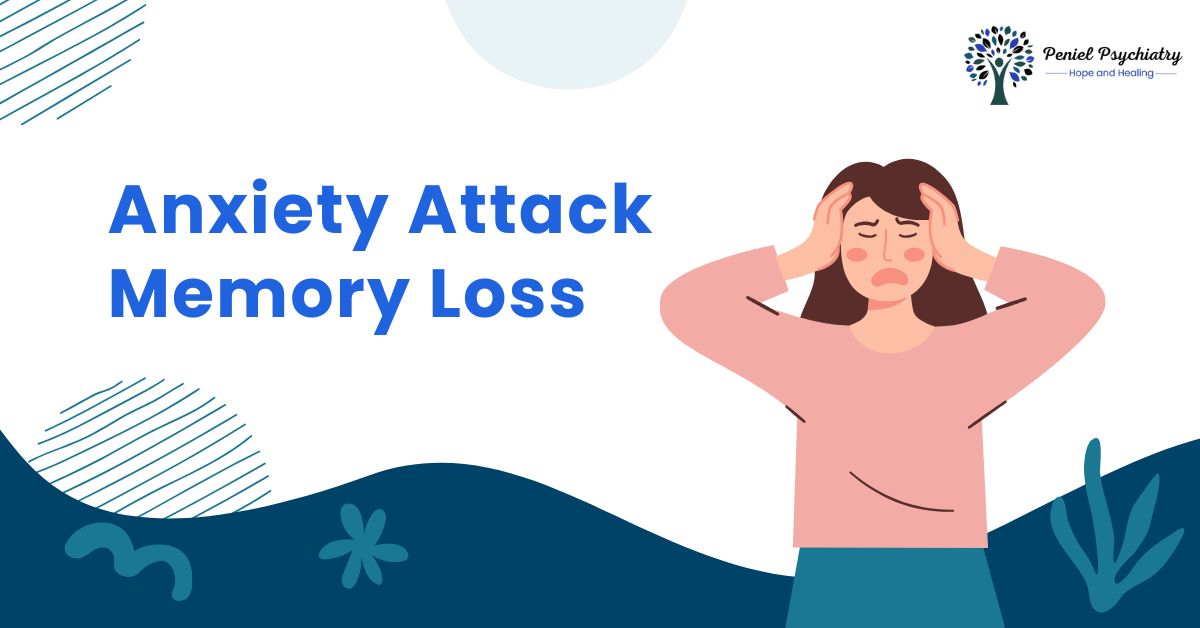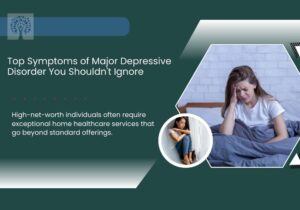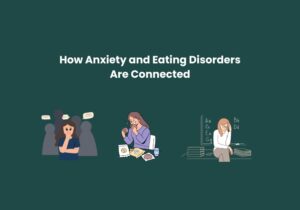Anxiety attacks and memory loss can feel scary. Your mind may go blank, or you might forget small things. If you find it hard to focus, zone out, or lose your train of thought, you are not alone. Many people have short-term memory loss or brain fog when they feel very stressed.
Anxiety can overwhelm the brain. This changes how it works. In this post, we will explain why this happens. We will also share how long it lasts and ways to help you feel more in control.
What Happens During an Anxiety Attack?
An anxiety attack causes an intense wave of fear that can come on suddenly. When this happens, your body reacts fast. You may feel your heart racing, your breathing quickening, or your chest tightening. These symptoms can make you feel like something is wrong, even if there is no real danger. Many people confuse anxiety attacks with panic attacks because they share similar signs.
What Are the Signs of an Anxiety Attack?
During an anxiety attack, your brain sends signals that trigger the fight-or-flight response. This means your body prepares to face or escape a threat. You might notice:
- Your heart is beating fast or pounding
- Trouble catching your breath
- Feeling dizzy or shaky
- Sweating or chills
- Nausea or stomach discomfort
- Feeling restless or tense
- Trouble focusing or thinking clearly
These feelings can be overwhelming. Your mind may race, or you might feel frozen. This is because your brain perceives a need to protect itself. But often, the fear is not tied to a real threat.
How Is an Anxiety Attack Different from a Panic Attack?
Anxiety attacks usually build up over time. You might feel uneasy or worried before the attack starts. Panic attacks, on the other hand, tend to hit suddenly and with more intensity. Both can cause memory problems or make you feel like your brain is foggy.
Read more articles on Slow Down Heart Rate During a Panic Attack.
Understanding these symptoms helps you recognize what’s happening. Knowing that your body is reacting to stress can make it less frightening. It also enables you to take steps to calm down and get support.
How Anxiety Affects Your Brain
Anxiety triggers your brain’s fight-or-flight response. When you feel stressed, your body releases hormones such as cortisol and adrenaline. These help you react quickly in danger. But when anxiety lasts too long, these chemicals can overload your brain.
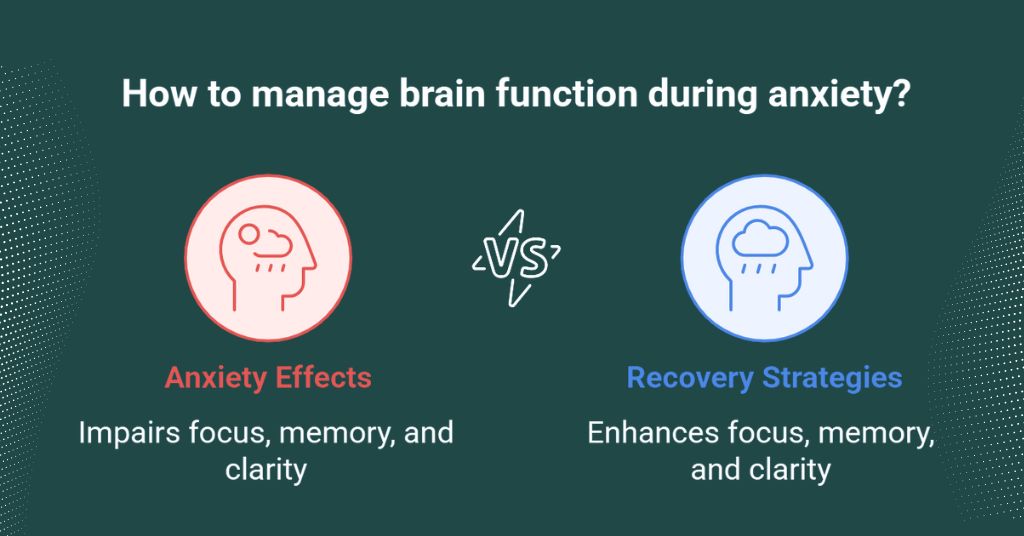
What Happens to Your Brain During Anxiety?
Cortisol and adrenaline affect how your brain works. They can make it hard to focus and remember things. You may experience “brain fog,” which means your thoughts feel cloudy or sluggish. This happens because your brain allocates energy to handling stress, rather than memory or clear thinking.
The hippocampus, a part of your brain that helps with memory, can get less active during high stress. This means you may have trouble with short-term memory. It may feel like your mind is blank or that you’ve forgotten what you just did.
Why Does This Matter?
When anxiety changes your brain function, it can make daily tasks harder. You may find it challenging to pay attention, make decisions, or recall simple details. This can make anxiety feel even worse. However, understanding how anxiety works helps you comprehend your experience.
The good news is that these effects are usually temporary. As anxiety calms down, your brain can recover. Taking care of your mental health helps your brain function more effectively.
Does Anxiety Cause Memory Loss?
Yes, anxiety can cause memory loss, especially short-term memory problems. When your brain is under stress, it struggles to focus on details. This can make it hard to remember what you just heard or what you were about to say.
What Kind of Memory Problems Does Anxiety Cause?
Many people with anxiety notice that they forget things easily. You might forget names, dates, or where you put everyday items. Sometimes, your mind may go blank during conversations or tasks. This happens because anxiety pulls your attention away from what you need to remember.
These memory problems are not the same as severe conditions like dementia. Instead, they come from your brain being overloaded with stress. Your brain’s focus shifts from storing information to dealing with fear and worry.
Is Memory Loss from Anxiety Permanent?
Usually, memory loss linked to anxiety is temporary. When your anxiety lowers, your memory often improves. You may still experience some fogginess during stressful times, but it typically clears up over time. If your memory problems last a long time or get worse, it’s essential to see a doctor to rule out other causes.
Why Anxiety Makes You Forget Things
When anxiety hits, your brain goes into survival mode. It focuses all its energy on keeping you safe. This means it ignores other tasks, like making new memories or recalling details. That’s why your mind might go blank or you forget things during an anxiety attack.
How Does Stress Affect Memory?
Stress floods your brain with chemicals like cortisol and adrenaline. These chemicals prepare your body to react quickly. But they also make it hard for your brain to store or retrieve information. This can cause short-term memory loss or brain fog.
Your brain treats the situation as urgent. It focuses on staying alert and ready, not on remembering what happened a moment ago. This is normal, but it can feel frustrating and scary.
Is This Memory Loss Permanent?
No, this kind of memory loss usually doesn’t last long. Once the stress or anxiety decreases, your brain can return to normal function. The memory problems are temporary and related to how your brain responds to high stress.
How Long Does Anxiety Memory Loss Last?
Memory problems caused by anxiety usually last a short time. When your anxiety calms down, your memory often improves. Most people find their focus and recall return within hours or days after the stressful event.
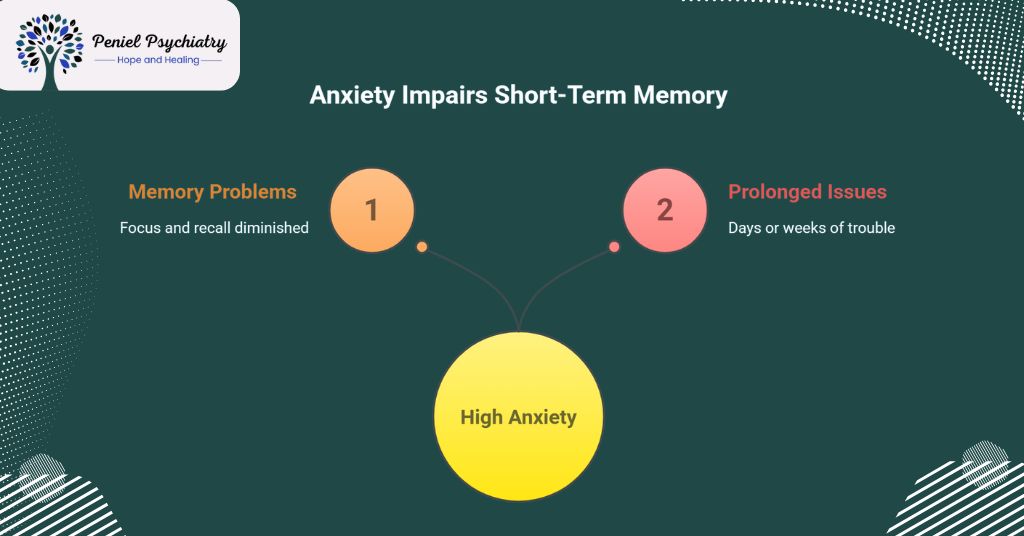
What Affects How Long Memory Loss Lasts?
The length of memory loss depends on how severe your anxiety is. High stress can cause memory issues that persist for an extended period. If anxiety happens often or stays for a long time, you might notice memory troubles for days or weeks.
Other factors, such as sleep, nutrition, and overall health, also impact how quickly your memory recovers. When you sleep poorly or feel tired, it can exacerbate brain fog.
When Should You Seek Help?
If memory problems last more than a few weeks or get worse, you should see a doctor. Long-lasting memory loss is not normal and may be a sign of another underlying health issue. A mental health professional can help you manage anxiety and its effects on your brain.
When Should You Worry About Memory Loss?
It’s normal to forget things sometimes when you feel anxious. But if your memory problems happen a lot or get worse, it’s time to pay attention. Memory loss that lasts a long time or significantly affects daily life may indicate something else is going on.
When to See a Doctor or Psychiatrist
If you frequently forget essential things, struggle to focus for extended periods, or feel confused, it is recommended that you consult a healthcare provider. They can check if your memory issues come from anxiety or another cause.
Sometimes, memory loss can be a sign of other health problems, such as vitamin deficiencies, infections, or brain issues. Receiving the correct diagnosis enables you to receive the appropriate treatment.
How Mental Health Professionals Can Help
Therapists and psychiatrists can help you learn to manage anxiety and reduce stress. They can also suggest treatments that improve memory and brain function. Early support can help prevent memory problems from worsening.
How to Improve Memory When You Have Anxiety
Anxiety can make it hard to focus and remember things. But you can take steps to help your memory and calm your mind.
Simple Ways to Help Your Memory
Begin with daily calming habits, such as deep breathing or mindfulness. These can help reduce stress and improve your brain’s function. Getting enough sleep is very important. When you sleep well, your brain has time to rest and process memories.
Eating healthy foods and drinking enough water also support your brain. Try to avoid too much caffeine or sugar, which can make anxiety worse.
How Peniel Psychiatry Helps
Peniel Psychiatry offers support for people dealing with anxiety and memory problems. Their team provides therapy that helps you manage anxiety symptoms and reduce stress.
They also offer medication management when needed to help balance brain chemistry. The staff understands how anxiety affects memory and provides care tailored to your needs.
Booking a session is simple. At Peniel Psychiatry, you get compassionate support without judgment. They help you take steps toward better mental health and clearer thinking.
FAQs About Anxiety Attack Memory Loss
Can anxiety attacks cause memory loss?
Yes. Anxiety attacks can cause short-term memory loss and brain fog due to how stress affects your brain.
Is memory loss from anxiety permanent?
No. Memory problems linked to anxiety usually improve once anxiety levels go down.
Why do I forget things during anxiety attacks?
During anxiety, your brain focuses on survival, which can make it hard to store or recall memories.
When should I see a doctor about memory loss?
If memory issues persist for a long time, worsen, or significantly impact daily life, you should consult a healthcare provider.
How can I improve my memory, which is affected by anxiety?
Calming techniques, good sleep, healthy eating, journaling, and therapy can all help improve memory and focus.
Final Thoughts
Memory problems during anxiety can feel worrying. However, these issues often stem from your brain working hard to cope with stress. They are usually temporary and improve as anxiety eases.
You’re not alone in this. Many people face similar struggles. Taking steps to manage anxiety, like practicing calming techniques and getting support, can help your memory and focus.
If memory loss lasts a long time or feels severe, don’t hesitate to reach out to a healthcare professional. With the right help, you can feel clearer and more in control again.

